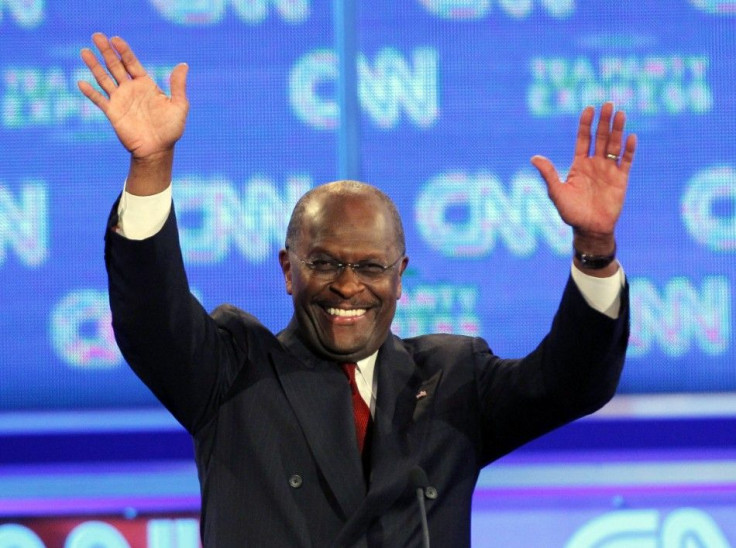Herman Cain: From Godfather to President?
ANALYSIS

Herman Cain, the African-American businessman, has surged in popularity ratings among Conservative Republicans seeking to unseat President Barack Obama. Cain, the former chief executive of the Godfather Pizza chain, who now poses a serious challenge to front-runner Mitt Romney, scored a big hit with the conservative base by slamming the Occupy Wall Street protesters and by his repeated criticisms of the Obama administration.
International Business Times spoke with a political expert about the rise of Herman Cain.
Jamie Chandler is a professor of political science at Hunter College in New York City.
IBTIMES: Herman Cain said blacks have been “brainwashed” into voting Democratic. Does he have a point? Don’t blacks overwhelmingly vote Democrat regardless of the quality/experience of the candidate?
CHANDLER: Herman Cain's use of the term brainwashed mischaracterizes black voters’ loyalty to the Democratic Party.
Political science research indicates that black voters have rational reasons for voting Democrat. Most view Republican policies as hostile and its mostly suburban, white, and middle-class base as unwelcoming.
IBTIMES: In the event we have a Cain-Obama presidential election in 2012, would you expect a significant number of black voters to shift their support to the GOP?
CHANDLER: An Obama-Cain match-up would see a moderate share of Red State blacks shift their support to the GOP. These voters would likely be middle-class, social conservatives, who will base their vote on Cain's economic views.
However, it's unlikely Cain would win the nomination. Cain has not built a strong, multi-state campaign organization or raised enough money to win important, early primary races such as New Hampshire, South Carolina, Arizona, and Michigan. Cain could, however, spoil the chances for Rick Perry or Mitt Romney should he win the Iowa Caucus.
IBTIMES: Herman Cain has never before held any kind of political office. Has anyone ever become U.S. president without having any prior political experience?
CHANDLER: There have only been a few U.S. presidents without political experience. Zachary Taylor, Franklin Pierce, Ulysses S. Grant and Dwight D. Eisenhower were all career military men whose first elected office was the presidency.
However, Cain is not political neophyte; he has a long history of political experience. For example, as president of the National Restaurant Association he heavily lobbied against the 1994 Clinton Healthcare Reform Proposal. He also served as senior economic advisor to Republican Bob Dole's 1996 Presidential campaign, and he ran for U.S. Senate in 2004 in Georgia.
IBTIMES: Cain appears to have right-wing social and fiscal views. But are there any subjects where he differs from mainstream Republican orthodoxy?
CHANDLER: Some of Cain's views differ from the orthodoxy. He supports wholesale, across-the-board budget cuts instead of selective reductions; he endorses 2nd amendment gun rights, but with state-level gun control regulation, and he also espouses a less aggressive foreign policy instead of the militarism of the Bush era.
IBTIMES: I’d think that a Cain-Obama presidential battle would receive unprecedented global coverage and huge voter turnout. Do you agree?
CHANDLER: An Obama-Cain match-up would generate as much or more global media coverage as the 2008 election because of the historical nature of the race. However, there will not be a huge surge in turnout. The 2012 season seems to lack the confluence of events that saw a large influx of new voters cast ballots in 2008.
© Copyright IBTimes 2024. All rights reserved.











